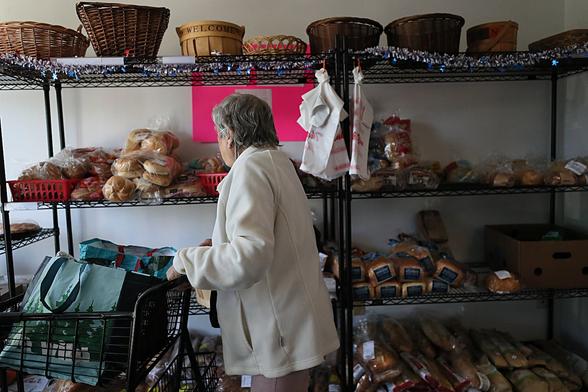Some pointers from "The Eye of Every Storm - #Anarchist Response to Hurricane Helene"
#CrimethInc, 2024-11-13
"At the end of September 2024, western North Carolina and the surrounding states experienced 30 inches of rainfall over two days when an unnamed storm collided with Hurricane Helene over the mountains of Southern Appalachia. The resulting catastrophe laid waste to the entire region. At a time when #misinformation, rising #authoritarianism, and disasters exacerbated by industrially-produced climate change are creating a feedback loop of escalating crisis, it’s crucial to understand #DisasterResponse as an integral part of community defense and strategize about how this can play a part in movements for liberation. In the following reflection, a local anarchist involved in longstanding disaster response efforts in #Appalachia recounts the lessons that they have learned over the past six weeks and offers advice about how to prepare for the disasters to come.
"The National Oceanic and Atmospheric Administration estimated that Hurricane Helene poured 40 trillion gallons of water on the region. This caused an estimated 1800 landslides; it damaged over 160 municipal water and sewer systems, at least 6000 miles of roads, more than 1000 bridges and culverts, and an estimated 126,000 homes. There have been over 230 confirmed deaths across six states with many still missing.
"The entire region was completely cut off from the outside world for a day or more, with all major roads shut down by landslides, collapsed bridges, and downed trees. Water, power, internet and cell service all went down within hours of the hurricane arriving, and remained down for days or, in some areas, weeks. There are still communities that will likely not have electricity for another three months because the roads that the power company would use no longer exist. Six weeks into this disaster, there are still tens of thousands of people who lack access to drinkable water. Not only have thousands of homes been wiped off the map—in many cases, the land they rested on no longer exists. Massive landslides have scoured canyons 30 feet deep, exposing bedrock that has not seen the light of day for tens of thousands of years. The torrential floods moved so much earth and caused so many rivers to change course that scientists have designated the hurricane a 'geological event.'
"In response, a beautiful web of mutual aid networks has emerged, saving countless lives by bringing in #EssentialSupplies, providing #MedicalCare, setting up neighborhood #WaterDistribution centers, #SolarChargingStations, #SatelliteInternetHubs, free #kitchens, free #childcare, and more. Name a need and there are folks out here who have self-organized to meet it. We share these lessons we have learned in hopes of helping others to prepare for similar situations, aiming to increase our capacity to build autonomous infrastructure for the long haul.
Start Preparing Now
"There is no time like the present to get organized.
"Our mutual aid group has been around for almost eight years. Within 72 hours of the floodwaters receding, we had a functioning mutual aid hub and were mobilizing folks to check on missing people and #ChainsawCrews to cut people out of their homes and open up roads. We were only able to do these things because we had already put in the work in our community to build the trust and relationships that are so vital in times of crisis.
"While we are a small group, we have an extensive network of friends and allies that has grown throughout years of smaller-scale mutual aid and organizing efforts. The best way to prepare for a disaster is not to stockpile supplies, but to build trust in your community and nurture a healthy web of relationships. The best way to accomplish this is to start doing mutual aid projects in your community before an acute crisis arises. This will give you practice operating as a group and organizing logistics, and it will also connect you with others you wouldn’t otherwise meet and show them that they can count on you. Because of the work we had already put in, when the crisis hit, people turned to us and spread the word that we are a good group to funnel supplies and money through. You can only build that kind of reputation by putting in the work now.
Communications
"One of the biggest initial challenges we faced was that most means of communication went offline for between 24 hours and several weeks, depending on where you lived. That includes #landlines, #CellPhones, and internet. We can’t stress enough the importance of having multiple back-up options in place to be ready for a situation like this. First of all, make sure you have a place and time established in advance where folks know they can find each other in the event of a disaster. This is probably a good idea even if communications don’t go offline—nothing beats face-to-face communication.
"Satellite internet was invaluable during the first couple of weeks. For some particularly hard-hit communities, it remains the only means of communication six weeks into this disaster. Unfortunately, #Starlink, which is owned by the white supremacist Elon Musk, has proven to be the most useful and the easiest to set up in a disaster scenario. We know from past experience that he is eager to suppress social movements that use his companies’ services. There are other companies that provide satellite internet, but it tends to be slower, with significant data limits. These are generally not mobile systems and would be challenging to set up in the middle of a disaster.
"Don’t forget that you will need a source of electricity such as a generator or solar power to make satellite internet work.
"Radios, especially ham radios, are another important means of communication that should be arranged in advance with people who already know how to use them. Our mountainous terrain limits the distance that radios can broadcast, but it would still have been helpful if we had possessed ham radios.
Getting Organized
"Grassroots disaster relief is no longer the exclusive province of church groups and small bands of autonomous mutual aid groups. The notion has gone mainstream since the beginning of the COVID-19 pandemic, when so many people discovered that their neighbors were all they had to count on. At this point, well-organized and well-resourced groups of every stripe are prepared to mobilize quickly—from reactionary right-leaning groups like the Cajun Navy and to networks of volunteer helicopter pilots, not to mention radical groups like Mutual Aid Disaster Relief. Beyond these specific groups, more people understand how to self-organize now. Within three to five days of the flood waters receding, you couldn’t drive more than ten minutes without running into a #DIY #ReliefHub or water station in someone’s front yard, church, or gas station parking lot. It would not be an overstatement to say that within a week, western North Carolina had the highest concentration of four-wheelers, all-terrain vehicles, and dirt bikes in the world, as people poured in from all over the South and beyond to help with search and rescue and to get supplies out to cut-off communities.
"Most of these hubs were truly #grassroots, with no formal organization behind them. This is an overwhelmingly positive development, but it does not come without challenges. The chief problems were redundancy of effort and lack of coordination between relief hubs, road clearing crews, and people doing #SupplyRuns, search and rescue, and wellness checks. The sooner you can develop relationships and good communication systems with other hubs, the better, so you won’t have to be constantly reinventing the wheel.
"Creating an intake system for incoming volunteers and arranging for people to coordinate them is a huge piece of the puzzle. We had to turn away many offers of help in the first few weeks because we didn’t have a good system in place for fielding newcomers, especially those from out of town, nor could we guarantee that we could plug them into a project on any given day if they just showed up, despite the fact that there was always a mountain of work to do. Connecting volunteers to communities and individual homes that need medical care, mucking, gutting, and repairs requires an enormous amount of legwork on your part, not to mention building trust between you and the residents. You would do well to have someone in your group that has a deep love of spreadsheets."
Full article:
https://crimethinc.com/2024/11/13/after-the-hurricane-anarchist-disaster-response-in-appalachia
#MutualAid #ClimateChange #Preparedness #BuildingCommunity #CommunityPreparedness #CommunityDefense #Polycrisis #HamRadios












